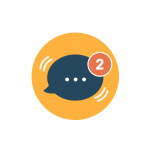Using Social Media at Night
It may be hard for some to remember the last time that they got a proper, full night’s sleep as we talk about naps and sleep this week. Schoolwork, jobs, and extracurricular activities are just a few things that can contribute to an adolescent’s hectic and busy schedule. Simply put, there aren’t enough hours in the day for people to do everything that they want, and they often sacrifice the time they should be using sleeping to get everything else done.
Reports have shown that adolescents today are not getting enough sleep as they should be getting, which should be at least eight hours. It’s well known by know that there are many health risks associated with poor sleep, and irregular sleep patterns are also classified as symptoms for mental illnesses such as depression.
A common solution that experts recommend doing to change sleeping behaviors is to at least reduce, if not completely cut out technology as you start to get ready for bed. This often means not using your computer in bed, physically keeping your phone away from you, and not exposing yourself to any screens.
However, it’s not uncommon to wake up in the middle of the night for no apparent reason. This is known as “nocturnal awakenings.” Depending on what stage of the sleep cycle that you disrupt when you wake up, it can be simple minutes to long, grueling hours before you fall back asleep. The causes for nocturnal awakenings can vary, but stress is cited as a major factor.
But what do people do when nocturnal awakenings happen? Realistically, most people, especially adolescents, don’t make an effort to keep their technology away from their bed. 1 in 5 adolescents routinely use their phone after waking up in the middle of the night, specifically to use social media. In the UK, nearly all of the adolescents who said they use their phone when they should be sleeping are on social media.
One big reason? Adolescents feel that they may have missed out on something if they don’t check their phone. Notifications are also a reason that about 30 percent of adolescents wake up in the middle of the night. And even if it’s not the reason that they wake up, just seeing that they got a notification can keep adolescents up longer. Notifications and social media engagement influence the “reward system” in our brains, and in adolescents, the pleasure and pain associated with rewards are even stronger. Seeing a notification can make us excited, because we don’t know what it’s going to be about, and going through them all to see which one is “good” makes us respond and use our phones longer.
Unfortunately, it’s easier said than done for people to stop using their phones before they go to bed. But when harmful sleeping patterns among adolescents continue to be a problem, making a cycle out of having trouble sleeping, staying asleep during the night, and taking too-long naps can have potentially long-term effects.
Do you keep your phone near you when you sleep? Do you find yourself waking up in the middle of the night and immediately go to check it? How do you think adolescents can realistically change these habits?







Recent Comments